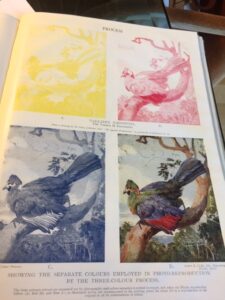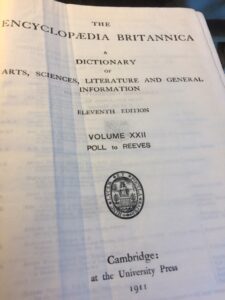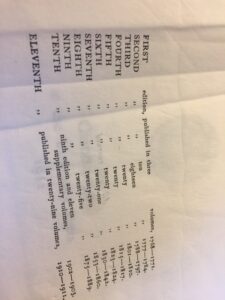 JP owns 29,000 pages of a major book. Yes, the Encyclopedia Britannica, the famed Eleventh Edition (1910-1911), the BEST encyclopedia EVER. He found it at Goodwill!
JP owns 29,000 pages of a major book. Yes, the Encyclopedia Britannica, the famed Eleventh Edition (1910-1911), the BEST encyclopedia EVER. He found it at Goodwill!
Let me explain why I consider it a treasure, and some of this story involves culturally obsolete beliefs. This Encyclopedia Britannica is a slice of history, not so ancient, but ever so dated. But what a feat of scholarship!
Its importance in the history of dictionary type knowledge
It contained everything anybody alive in 1910 needed to know.
 Sir Kenneth Clark, who I actually studied with, said of this edition, “One leaps from one subject to another, fascinated by the idiosyncrasies of the authors as by their facts and dates. It must be that last encyclopedia in the tradition of Diderot which assumes that information can be made memorable only when slightly colored by prejudice.”
Sir Kenneth Clark, who I actually studied with, said of this edition, “One leaps from one subject to another, fascinated by the idiosyncrasies of the authors as by their facts and dates. It must be that last encyclopedia in the tradition of Diderot which assumes that information can be made memorable only when slightly colored by prejudice.”
When we hear a British accent or British scholarship, we believe it. This eleventh edition became the last produced in England, although many scholars contributed from the US and Canada. It became a cultural artifact, the last of its kind before the devastation of WWI and WWII. When they edited THIS version the world saw the British Empire as an EMPIRE. Monarchs ruled, Kings sat on their thrones. Also this Encyclopedia Britannica stood as the basis for all later version until the 15th edition published in 1974.
Scholars whose names you KNOW wrote articles for this edition: John Muir, Swinburne, Ernest Rutherford, and Bertrand Russell. Thirty-four female scholars contributed, and today project Gutenberg chose it as THE encyclopedia.
Indeed a product of its time, lest we think we’re ‘above’ cultural currents. As one flips through the tissue paper thin pages, they might guiltily feel WE today influenced as well by the state of our times.
Famous examples found in the 1911 Encyclopedia Britannica :
- Americans won the War of Independence largely because “the US population had good English Blood and Instincts.”
- Diet or vitamins in food didn’t help Various diseases because we hadn’t discovered vitamins YET.
- The preponderance of articles deal with world geography. Less than half of the articles, in comparison to those dealing with geography, involve science or technology.
- When I myself read the entry on “Psychology” I saw no mention of Freud or Jung, too outré for the taste…
- A first, in the publishing history of this type of book, as this edition was first conceived in 1903. Articles were edited as long as the book was in production, the first part of the alphabet more highly edited that the latter.
- They saw the disapprove of eugenics as an obstacle to racial progress.
- Because the Encyclopedia held offices in New York and London, they dedicated the book to George V AND William Howard Taft.
In spite of these obvious flaws, and shudder, inducting pronouncements, the venerable Cambridge University Press published this eleventh edition. But in the mid 1920’s sold it to Sears Roebuck and Co.. For good or ill they widely disseminated it in America in a publication not so fancy nor leather bound, called the “Handy Volume Issue.”
Many Scholars Worked Together
 For this edition many scholars worked together, even though they often disagreed. Because they did so much discussing, they deemed it necessary to offer new insights in a yearly “yearbook.” Thankfully another publisher bought the rights from Sears, and it returned to a scholarly publication.
For this edition many scholars worked together, even though they often disagreed. Because they did so much discussing, they deemed it necessary to offer new insights in a yearly “yearbook.” Thankfully another publisher bought the rights from Sears, and it returned to a scholarly publication.
In the innovations of the eleventh edition the WHOLE reads like a dictionary, and the last volume, the 29th volume, serves as an index of author-contributors. It lists their names and “ranks” from Academica, the military, from the Church, from business, from science, from another era of another brain trust. After that it follows the innovation of a cross referenced INDEX, done by hand and mind, mainly by female editors, and cross referenced.
The value of such a twenty-nine volume set, in good condition, as opposed to other Encyclopedias, not worth MUCH, is $2,000. But what a treasure as an insight into what the world THOUGHT in 1910-1911!